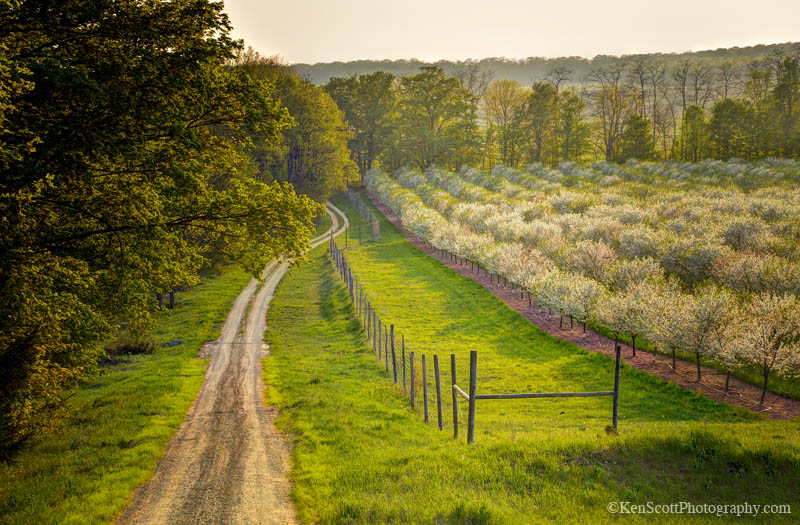
$20.4 Million for Farmland Protection, Watershed Restoration
By Art Bukowski | March 8, 2024
A big injection of federal dollars will help protect thousands of acres of farmland in Leelanau County (and beyond) from development.
The Leelanau Conservancy, Grand Traverse Band of Ottawa and Chippewa Indians, Grand Traverse Regional Land Conservancy and Conservation Resource Alliance formed a partnership called the Tribal Stream and Michigan Fruitbelt Collaborative.
The partnership, formed in 2015, recently announced an award of $20.4 million from the USDA’s Natural Resources Conservation Service (NRCS) as part of that agency’s Regional Conservation Partnership Program (RCPP). It is the partnership’s third award from the same source, with earlier awards of $12 million in 2016 and $4.4 million in 2021.
The partnership has two main objectives: replacing restricted road culverts with passages to facilitate the movement of fish and other aquatic organisms and purchasing conservation easements to prevent the development of agricultural and forested land. The tribe and CRA take the lead on the former, while the conservancies handle the latter.
A conservation easement is a voluntary legal agreement between a landowner and another party that permanently restricts the way land is used, most often by prohibiting residential or commercial development. These agreements have a cash value (because development rights have value) and are usually purchased, in this case by the conservancies. Once in place, the land is permanently protected, regardless of owner.
The conservancies have used easements and other tools to protect a combined total of more than 15,000 acres of farmland in the region since their inception (Leelanau in 1988, GTRLC in 1991). With land prices skyrocketing, the RCPP money is a very welcome boost for these efforts.
“I’m really excited because we have a long waiting list of people interested in protecting their land, and we need dollars to serve those folks,” Kim Hayes, farm protection director at the Leelanau Conservancy, tells The Ticker. “Having more dollars and more years to spend is a huge relief, because the need is there.”
The Leelanau Conservancy has already protected about 2,100 acres of farmland with its portion of the first two rounds of RCPP money, Hayes says. One very notable farm protected with these dollars is the Shimek Farm, located along M-72 where it jogs on the way from Traverse City to Empire.
Farming and farmland are at a breaking point in our region, conservationists say. Farmers are aging out and facing a lack of interest from the next generation, imports are weakening prices and the pressure has never been higher to sell for development. The RCPP dollars are “absolutely essential,” and a “game changer,” in regional farmland preservation efforts, says GTRLC Executive Director Glen Chown.
“All the shoreline in our area is developed or already protected, so the next frontier is the ridges that have those sweeping views, and that’s where the highest quality farmland is,” Chown tells The Ticker. “We feel an incredible sense of urgency to continue with farmland protection, because pavement is the last crop. Once it’s gone, it’s gone.”
The other key element of the partnership is improving the health of rivers, creeks, streams and other bodies of water by improving road crossings and replacing culverts. Many existing culverts are barriers to fish migration, preventing them from accessing important spawning and feeding areas. Improving these crossings better connects these bodies of water from an ecological standpoint.
Melissa Witkowski, a fish, wildlife and soil conservationist with the Grand Traverse Band, says the tribe and CRA have worked together to connect almost 350 miles of streams thus far and plans to connect another 72 miles with additional funding.
“The watershed and streams are earth’s blood and veins, so a project protecting that is important to the Grand Traverse Band,” she tells The Ticker. “The band’s connection to the fishery is deeper than any one species recovery project. The watershed work that we're doing is also benefiting offshore treaty fishers by protecting water quality and opening up spawning grounds for Great Lakes fish.”
Chown praised the Grand Traverse Band, which leads the partnership, along with the structure of the partnership itself, which he says demonstrates close, effective collaboration to achieve shared goals.
“This really is what conservation needs to look like in the future,” he says. “What’s going on here is a model for the nation.”
Editor's Note: Check our sister publication Traverse City Business News in April for an in-depth look at what conservation easements mean to farmers and farming in our region.
CommentWitherspoon Wins Tribal Chairman Seat; Other Grand Traverse Band Election Results
Sandra Witherspoon will be the next chairman of the Grand Traverse Band of Ottawa and Chippewa Indians ...
Read More >>Leelanau Sheriff's Office Searching For Missing Person
The Leelanau County Sheriff’s Office put out a bulletin on Tuesday afternoon asking for the public’s assistance ...
Read More >>Voters Approve Suttons Bay Bond Proposal
Voters approved an $18.3 million Suttons Bay Public Schools bond proposal intended in part to “rightsize” the ...
Read More >>The Latest Leelanau County Blotter & 911 Call Report
The Leelanau Ticker is back with a look at the most alarming, offbeat, or otherwise newsworthy calls ...
Read More >>



